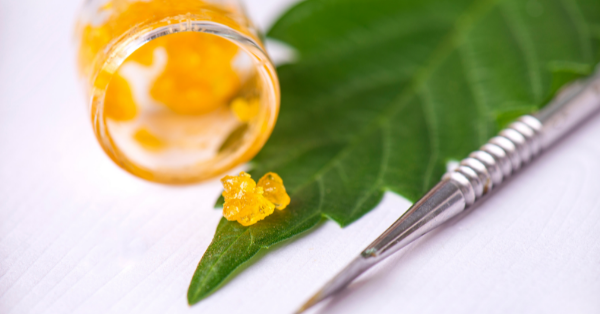Once upon a time — not long ago — the world of weed as we knew it only involved three letters: THC
Most people are aware that THC is the abbreviation of Delta-9-Tetrahydrocannabinol — the prominent psychoactive cannabinoid found in marijuana. Most also know that THC causes the lifted and euphoric feeling when they consume cannabis. However, since medical and recreational marijuana have become increasingly mainstream thanks to state-level legalization efforts, some other acronyms have popped up in our vocabulary. One such acronym is THCa.
The first time I heard THCa (tetrahydrocannabinolic acid) mentioned was when a buddy of ours came down to visit from Wisconsin and wanted to hit up EarthMed for THCa concentrates. So, don’t feel bad if THCa has yet to hit your radar. I am a seasoned stoner and had to look it up myself.
Here is the gist of this THCa that I speak of:
What is THCa?
THCa — the precursor to THC — is the non-intoxicating cannabinoid present in the trichomes of raw, live, and freshly harvested cannabis. But, this doesn’t mean that THCa is bad for your buds. Once the live plant is harvested, the THCa present is converted to THC as the plant dries. This process of converting THCa to THC is called decarboxylation (or decarbing) and can be sped up by applying heat to the raw cannabis material.
Does THCa Get You High?
THCa will not get you high on its own. Without the decarboxylation process, your THCa flower will not be very potent.
This chemical conversion is why you wouldn’t get wicked high from eating a bag of weed — despite what we have learned from pop culture references. Yes, you would still feel some effects from miscrodosing weed by popping a few dried buds in your mouth, but not nearly as much as if you were to decarb the weed by applying heat before you ate it.
If you purchase cannabis products like vape cartridges or topical creams from a dispensary such as EarthMed, you will notice on the label that the percentage of THCa is listed as well as the THC percentage. Since THCa is converted to THC when heat is applied, these percentages are relatively interchangeable if you plan on smoking, vaping, or cooking with your marijuana.
Effects of THCa
Even though THCa is typically consumed as THC, there are some particular health benefits that consuming raw marijuana plant material can provide. Patients who smoke weed for their cancer symptoms may find that THCa provides a similar level of relief. You can expect THCa to offer a sense of calmness, anti-inflammatory effects, and reductions in nausea without experiencing the euphoric and psychoactive effects commonly associated with THC. While THCa is largely unexplored in clinical studies, and more studies are desperately needed, the limited amount of data available shows that THCa benefits include:
- Neuroprotectivity – when used to treat neurodegenerative disorders (like Parkinson’s or Ataxia), THCa has effectively slowed damage to the nervous system and brain.
- Anti-inflammatory – THCa can help reduce inflammation, particularly in arthritis and lupus patients.
- Antiemetic – symptoms of nausea, vomiting, and appetite loss are decreased with the consumption of THCa. This can be particularly helpful for patients undergoing cancer treatment or suffering from disordered eating.
- Antispasmodic – THCa use has been linked to decreased muscle spasms in patients.
- Antiproliferative – In one study, THCa was found to inhibit the growth of cancerous cells.
Where to Find THCa
Now that you know what THCa is — you are probably wondering where to get it and how to use it. Keep in mind that when deciding to buy flower high in THC vs THCa, they’re more or less the same thing when handled properly. Any high-THC strain will also be high in THCa before applying heat, so looking for that type of strain would behoove you greatly.
Sometimes, if you are lucky, you might be able to find a THCa isolate in stock at your favorite dispensary.
How to Use THCa
If you stumble upon the unicorn of concentrates, buy it. The moment you apply heat to this concentrate, it will transform into a very potent form of THC. This concentrate can be smoked the same way as a dab or sprinkled on a bowl or in a joint with no fancy equipment needed.
I guarantee you will not be disappointed if you decide to branch out and try THCa flower. Speaking from the experience of when my friends came to visit from Wisconsin on a mission for THCa, it packs a punch that we thoroughly enjoyed.
Do you use THCa? Hit me up on social media and let’s spark up a conversation about it!
